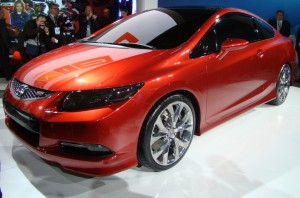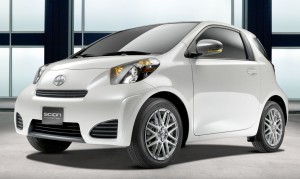
The Japanese parts shortage will mean shortages of the new Honda Civic - and a number of other models.
Honda has warned its U.S. dealers that it will be further cutting production due to the ongoing shortage of Japanese-made parts – which will likely result in a shortage of many products including the all-new Civic compact, which is just in the midst of what was supposed to be a high-profile launch.
The shortages will also force Honda to delay by at least a month the planned autumn launch of the updated 2012 CR-V crossover vehicle.
Honda is not the only maker feeling the pinch, however. Toyota, in particular, expects significant product shortages in the months ahead, and has delayed several key launches. Meanwhile, even Detroit makers are preparing for production delays, Chrysler today warning it could see its original 2011 production plans reduced by as much as 100,000 vehicles.
“Our goal remains to normalize overall production sometime around the end of the year,” John Mendel, executive vice president of sales for American Honda, told U.S. dealers in a written memo.
The March 11 earthquake and tsunami – and subsequent nuclear crisis – that struck the northeast corner of Japan’s main island virtually shut down the country’s auto industry for a month. Though most assembly plants are now up-and-running, production is a fraction of normal levels due to the vast number of parts suppliers based in the stricken region.
Key shortages include plastic and rubber parts as well as electronic chips used in as many as a quarter of the world’s motor vehicles.
In an interview last month, Mendel told TheDetroitBureau.com Honda was hoping to escape with minimal impact since about 80% of the vehicles it sells in North America are produced in local plants, but he warned that even the lack of a part as small as a speedometer needle could cause problems.
“The situation changes day-to-day. It’s very fluid,” Mendel stressed, adding that all Honda products use at least some components imported from the home market.
At that time, Honda had built about 18,000 of the new Civic sedans and coupes, but at current sales rates that would be equal to barely a half-month’s demand for the new model, which updates the sixth most popular vehicle in the U.S. automotive market.
The CR-V, meanwhile, is one of the most popular compact crossovers. But there are other products that could soon be in short supply, according to Mendel’s memo.
It warned that there will only be a limited number of imports coming from Japan of models produced exclusively at Honda’s home plants, including the Civic, CR-Z and Insight hybrids, as well as the subcompact Fit. The loss of those models is a particularly frustrating setback for Honda at a time when soaring fuel prices are boosting demand for small cars and gas-electric powertrains.
Honda is by no means alone. Toyota has trimmed its U.S. production schedule to barely a third of normal and imported models are in especially short supply.
The industry giant has temporarily delayed the launch of its Prius V, the first new model to share the Prius badge with the existing hybrid – the world’s most popular gas-electric model. The Scion iQ minicar, which was to have launched this upcoming season, is also facing an indefinite delay in the U.S. market.
Toyota officials said, last month, that they don’t anticipate getting production back to normal until November or December 2011.
But domestic makers are also feeling the heat as they struggle to find ways around the Japanese parts shortages. As TheDetroitBureau.com reported, General Motors has set up three “war rooms,” in Detroit, Shanghai and Tokyo, aiming to prevent further closures after the brief shutdown of a Louisiana assembly plant.
Meanwhile, Chrysler CEO Sergio Marchionne today warned that the maker could lose anywhere from 50,000 to 100,000 units of production due to parts shortages this year.

